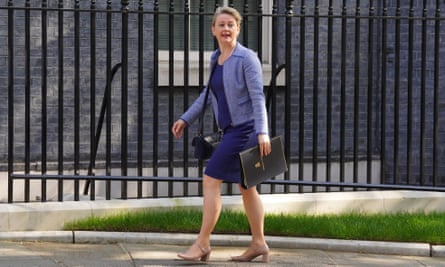It was three weeks after Christmas when the bombshell letter arrived. Guy Shahar and his wife, Oksana, looked at each other in stunned disbelief.
They had followed the Guardian’s investigation into the carer’s allowance scandal that has left thousands of families with crippling debts and criminal records. Not once did they think they would join them.
“Important,” it read in big bold type. “You have been paid more carer’s allowance than you are entitled to. You now need to pay this money back”.
The sum being demanded by the government was staggering: £10,180.45.
“It just didn’t seem real,” said Guy, 53. “It was so surreal and outrageous we assumed there must have been some sort of mistake”.
There was no mistake. The family, from Feltham in west London, had unwittingly breached the strict earnings limit that has left hundreds of thousands of carers paying back huge sums to the Department for Work and Pensions (DWP) in a saga that has been compared to the Post Office scandal.
Oksana, 53, had overstepped the earnings limit by just £1.92 a week on average while juggling caring for their son Daniel, 15, who has autism, with part-time roles as a school dinner lady and a zero-hours contract at Sports Direct.
In some weeks, she was paid just 38p more than the threshold – but for that tiny infraction she is being forced to repay £64.60 each time, the rate of carer’s allowance at the time.

Unpaid carers are allowed to work as long as their earnings do not breach the strictly enforced weekly threshold, which is £196. If their income exceeds this limit, even by as little as 1p, they must repay the whole week of carer’s allowance – meaning a breach of even 1p would trigger a fine of £83.30.
This so-called “cliff-edge” approach has been widely condemned as “cruel and nonsensical” and “perverse” after a Guardian investigation exposed how scores of unpaid carers had been caught in the trap, leaving many saddled with five-figure debts and others with criminal convictions.
As of February, nearly 100,000 carers across the UK were repaying sums as high as £20,000 after breaching earnings rules, according to the latest official figures.
A Guardian analysis of five years of Oksana’s earnings show that on average she was paid less than the DWP’s strict threshold for three of those years. In another year, her earnings exceeded the limit by an average of just 83p a week – but for this infraction they must repay £1,938 for the year.
Across the whole five-year period, she earned a total of £505 more than the rules allow – an average of £1.92 a week. Yet instead of repaying £505, the DWP is demanding £10,130.45 – plus a £50 “civil penalty”.
“It will devastate us financially,” said Guy, who founded the charity Transforming Autism. “It just seems so unfair that it’s not even real. It just feels like this actually can’t go through. In any sort of ethical world, this would not happen.”
The well-documented failure of the DWP to alert carers immediately to these overpayments meant that instead of being notified in 2018, when they first began, the Shahars were not told until January – nearly seven years later.
This meant they unknowingly accrued debt until 2023, when they stopped receiving carer’s allowance after Shahar notified the DWP that she had been able to increase her hours at Sports Direct.
The DWP’s top official, Peter Schofield, promised MPs in 2019 to end the delays that have left scores of carers incurring enormous debts by accident – yet six years later the failure is continuing.
“They never alerted us – not even once,” said Guy. “They let it build up and then more than six years later they’re slapping this enormous fine on us. I feel really let down by the system.”
The DWP is supposed to consider a carer’s average earnings when deciding whether they have broken the rules. However, the way officials do this is inconsistent.
In Oksana’s case, they punished her on the basis of her individual weekly pay rather than her average earnings despite this approach being criticised as unfair by tribunal judges.
“It’s like it’s set up to be a booby-trapped benefits system. It’s inhumane,” said Shahar. “It traps families into long-term debt, anxiety and mental health issues and leaving us much worse off rather than better off to look after the people we’re supposed to be caring for.”
Liz Kendall, the welfare secretary, ordered an independent inquiry into carer’s allowance last year after the Guardian’s investigation. The review, by the former Disability Rights UK chief executive Liz Sayce, is due to report within weeks.
Earlier this month the DWP said it was boosting staff numbers in an attempt to clear the huge backlog of thousands of unpaid carers who have unwittingly exceeded the earning limit – and will almost certainly now be punished.
The family appealed against the £10,000 fine but it was rejected by the DWP. They are now awaiting the outcome of a second challenge.
Guy said the government’s “unfair persecution” had left them distressed and devastated: “It was like the whole foundation of the life that we’d created, which is a very simple life and it’s on fragile foundations anyway – it’s like those foundations were just being taken away. And they’re being taken away by people who’d been telling us all along that they were there to support us”.
Helen Walker, the chief executive of Carers UK, urged the DWP to write off debts in cases like the Shahars’ – and said the case highlighted the need for wide-ranging reform.
“I’m saddened and concerned by the fact that we’re still hearing of fresh instances of those, like Guy and his family, who have fallen foul of an inflexible and unfair system,” she said. “This is a clear demonstration of why we need to see a better alternative to the current ‘cliff-edge’.”
A DWP spokesperson said: “We have paused the recovery of Mrs Shahar’s overpayment pending the outcome of her appeal.
“We understand the struggles facing so many carers, which is why have launched an independent review of carer’s allowance, to explore how earnings-related overpayments have occurred and what changes can be made. This is due to report in the summer and the government will consider its findings following its conclusion.”
Source: theguardian.com
















